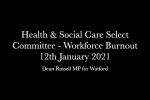Dean Russell: I thank the families for such powerful testimony today. The question I have, if I can come to you first, Dr Macleod, is around compassion in the system. We often talk about systems and clinical processes, but at the heart of all this are grieving families or families adjusting to something that they never expected, especially when it is around births, and a moment that will stick with them forever. I wondered if there was any guidance on what we should be doing within the litigation process, in the first few days and months, around mental health support and compassion, so that people do not feel that they are adversarial or that they are the enemy of the system in having to bring up these complaints, but that they are fully supported.
Dr Macleod: If you are looking at the litigation system, you have to bear in mind that by the time someone goes to a lawyer they have usually had a bit of time. People do not go straight from the hospital where the incident occurred to the lawyer’s office. They simply do not. Of the people who contact claimant lawyers with a potential concern, about 95% are filtered out. What we see going through to cases is actually a very tiny minority of the concerns that people have and that they have raised with lawyers. There is clearly a need to address the concerns people have, and much earlier in the process. I do not think that is something that the clinical negligence system, as it stands, can address because it is reactive, in that it waits for someone to go to a clinical negligence lawyer.
If you look at other countries and patient injury compensation in Sweden, for example, what happens in a lot of cases there is that the doctor or nurse will sit down with the patient in the hospital and say, “Look, there has been a mistake,” or, “Something has gone wrong. We will sit down with you and fill in the form with you.” There are advocates in each hospital who do that, so that the claim for compensation goes through with the support of the staff. That happens partly because it is on an avoidable basis, so staff do not feel blamed. It also leaves patients in a position where they are cared for from the outset rather than almost abandoned and left to find their own route through.
Dean Russell: Sir Ian, you mentioned the example of the lift going down to the basement rather than up a floor and so on. One of the things that occurs to me is that whenever there is an awful situation—as with the testimonies we have heard—you often then hear that there were smaller examples of near misses or other issues, with the lift being a good example. Is there a role beyond the examples we have heard today for a root and branch review of how patients can feed in their experiences within hospitals and the healthcare system, either through technology or surveys, so that the smaller issues are picked up that might then lead to the bigger issues coming down the line that no one has noticed?
Sir Ian Kennedy: There may be. Patients are experts in some things, particularly their own lives and their own expectations, but they are not necessarily experts in how the hospital works. They are often bewildered by it. Yes, of course, stepping back a little, in my view—I agree with Sonia to a degree—there is a role for a regulator, inspector or ombudsman, whose job it is to collect data. The key is what data you are seeking to collect. One of the important sources of data is complaints or observations, or even compliments. A good regulator, if we could even design one, would collect that data and have it collated with lots of other data to understand how that particular enterprise, whether it is a GP practice, a trust or a world-famous tertiary centre, is working and what the range of problems is.
A good regulator, as I was trying to create, would be quite active in scanning that data and having appropriate algorithms to mine it. They would say, “You are beginning to have a problem here.” If the hospital said, “No, we don’t,” then they have a problem and you would have to look at it. If they said, “Yes, we cannot recruit some nurses in that particular area,” the regulator would say, “All right, we’ll stay with you, and see if we can help you and stay on the case.” You are absolutely right that these apparently minor events can be seen in a context. The context is one in which things, in the great systems analysis, are like Swiss cheese. You get through one hole and another hole, and at one point you get right through the cheese and then something awful happens. If you could spot the first hole with a good inspectorial ombudsman or regulatory system, with good data, you are beginning to help patients.
Dean Russell: Thank you. Sir Robert, many of these cases are isolated in some instances, but earlier you mentioned the learning process. How much learning is there in the system? Often, when we have had big reports when there have been major issues at hospitals, there are reviews, inquests and all those things that ultimately are learnt by the system. Every time there is a situation like this, when there is litigation, does the entire NHS learn from it, or is it just, “That’s it,” and they breathe a sigh of relief that it is done with and they move on to doing the day job again?
Sir Robert Francis: I think the answer is somewhere in between the two. NHS Resolution instructs its lawyers now to draw safety-related information out of cases, which they will report back to the trust. They publish reports, as do the medical defence societies, which talk about generic lessons to be learnt. None of that seems to me to be done on a terribly systematic basis. It is a little bit haphazard. Frankly, with all due respect to my legal colleagues, your average medical negligence lawyer, whether a solicitor or a barrister, is not necessarily the best equipped person to decide what the safety learning should be in relation to a particular incident. That is not what we are trained to do. We rely on other people’s evidence. Relying on litigation to provide the answer at the moment is hopeless, frankly, because of the time litigation is taking.
I do not think that is the answer. If I could go back to complaints, I think there is learning there. I will put my Healthwatch England hat on, if I may. We published a report called “Shifting the mindset” last year, which did a survey of hospital complaint systems and what they do. I am afraid that a large proportion of them are not even obeying the minimum statutory requirements for reporting complaints. Many only report numbers. Very few report more than a category of complaint. Virtually none, though there are some, tell the stories from which there could be generic learning. There is a huge resource of information from complaints that is not being used. One can add to that, if I can get on to my hobby-horse, the information that comes through the friends and family test. There are figures and we can calculate the numbers, but there is a huge amount of data in textual comments. For instance, we at Healthwatch England have no access to those because of data protection requirements.
Chair: I think Sir Ian wants to come in on that point as well.
Sir Ian Kennedy: To add to what Robert said, one of the ways in which you can ensure that the lessons that have been demonstrated here can be disseminated is that you make them a standard that the regulator judges performance against. If you make one of the standards the extent to which you have incorporated in your practice what has been demonstrated to work in Hull, or avoided what has been shown to be mischievous in another place, you will have to report on that, and that data will be collected as part of the performance against standards. That is the way you do it. As Robert and I know, if you do not measure it, it does not get done.



